
Security News
Deno 2.2 Improves Dependency Management and Expands Node.js Compatibility
Deno 2.2 enhances Node.js compatibility, improves dependency management, adds OpenTelemetry support, and expands linting and task automation for developers.

I believe that many people who work with FastApi to build RESTful CRUD services end up wasting time writing repitive boilerplate code.
FastAPI Quick CRUD can generate CRUD methods in FastApi from an SQLAlchemy schema:
FastAPI Quick CRUDis developed based on SQLAlchemy 1.4.23 version and supports sync and async.
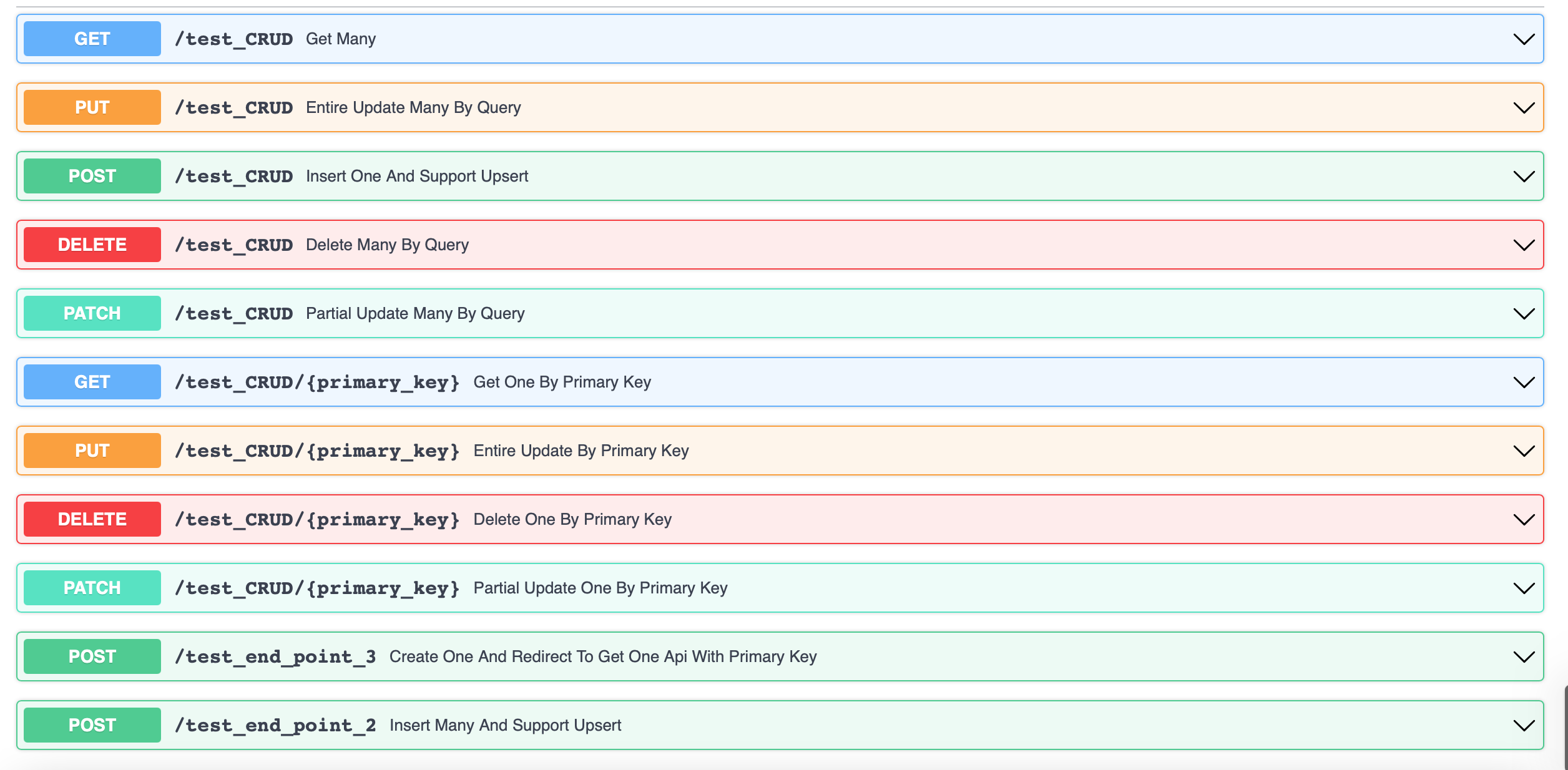
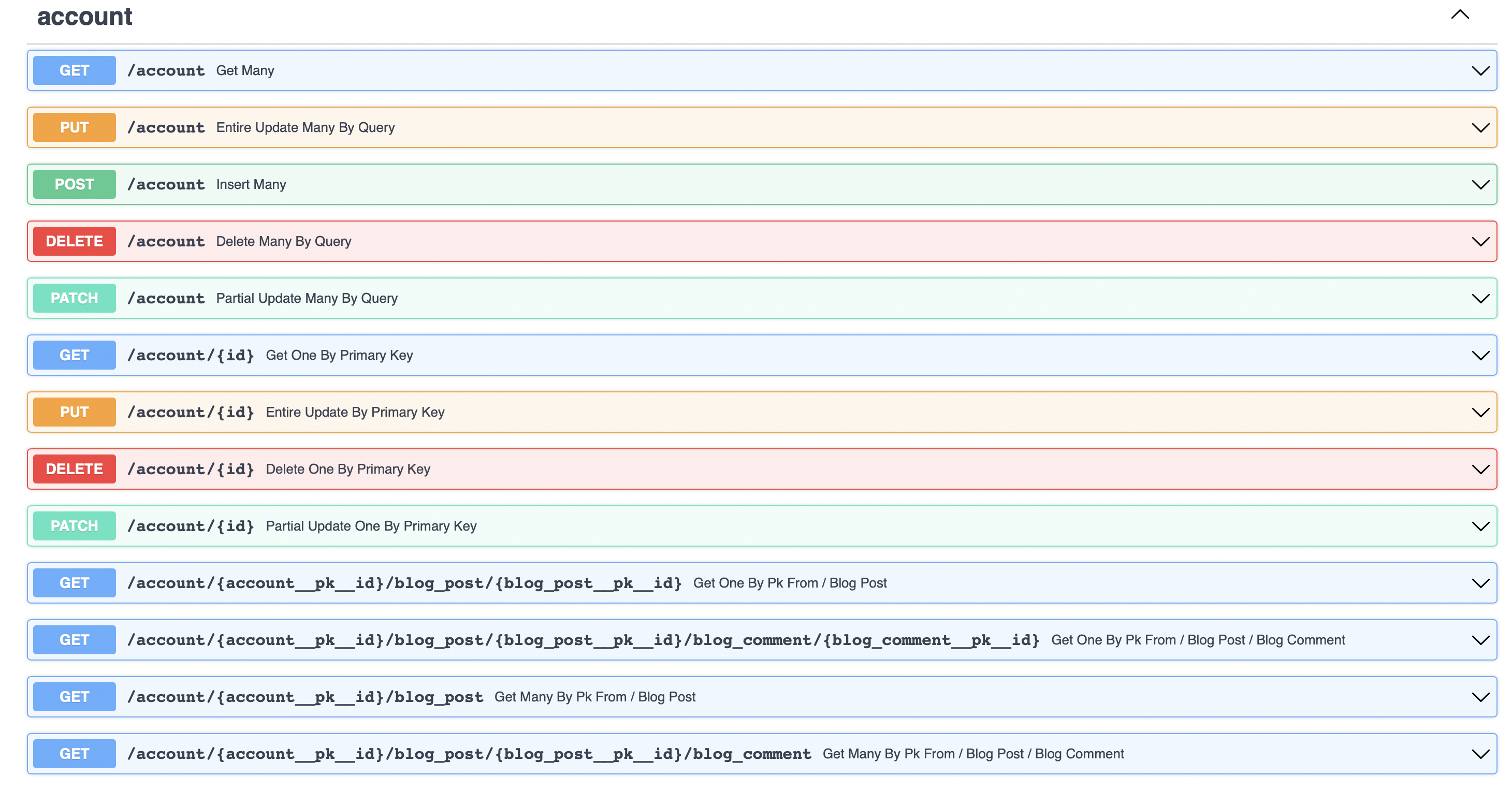
Support SQLAlchemy 1.4 - Allows you build a fully asynchronous or synchronous python service
Full SQLAlchemy DBAPI Support - Support different SQL for SQLAlchemy
Support Pagination - Get many API support order by offset limit field in API
Rich FastAPI CRUD router generation - Many operations of CRUD are implemented to complete the development and coverage of all aspects of basic CRUD.
CRUD route automatically generated - Support Declarative class definitions and Imperative table
Flexible API request - UPDATE ONE/MANY FIND ONE/MANY PATCH ONE/MANY DELETE ONE/MANY supports Path Parameters (primary key) and Query Parameters as a command to the resource to filter and limit the scope of the scope of data in request.
SQL Relationship - FIND ONE/MANY supports Path get data with relationship
xxx/{primary key} for tables without a primary key;
UPDATE ONEFIND ONEPATCH ONEDELETE ONEI try to update the version dependencies as soon as possible to ensure that the core dependencies of this project have the highest version possible.
fastapi<=0.68.2
pydantic<=1.8.2
SQLAlchemy<=1.4.30
starlette==0.14.2
pip install fastapi-quickcrud
I suggest the following library if you try to connect to PostgreSQL
pip install psycopg2
pip install asyncpg
run and go to http://127.0.0.1:port/docs and see the auto-generated API
from fastapi import FastAPI
from sqlalchemy import Column, Integer, \
String, Table, ForeignKey, orm
from fastapi_quickcrud import crud_router_builder
Base = orm.declarative_base()
class User(Base):
__tablename__ = 'test_users'
id = Column(Integer, primary_key=True, autoincrement=True, unique=True)
name = Column(String, nullable=False)
email = Column(String, nullable=False)
friend = Table(
'test_friend', Base.metadata,
Column('id', ForeignKey('test_users.id', ondelete='CASCADE', onupdate='CASCADE'), nullable=False),
Column('friend_name', String, nullable=False)
)
crud_route_1 = crud_router_builder(db_model=User,
prefix="/user",
tags=["User"],
async_mode=True
)
crud_route_2 = crud_router_builder(db_model=friend,
prefix="/friend",
tags=["friend"],
async_mode=True
)
app = FastAPI()
app.include_router(crud_route_1)
app.include_router(crud_route_2)
from fastapi import FastAPI
from fastapi_quickcrud import crud_router_builder
from sqlalchemy import *
from sqlalchemy.orm import *
from fastapi_quickcrud.crud_router import generic_sql_crud_router_builder
Base = declarative_base()
class Account(Base):
__tablename__ = "account"
id = Column(Integer, primary_key=True, autoincrement=True)
blog_post = relationship("BlogPost", back_populates="account")
class BlogPost(Base):
__tablename__ = "blog_post"
id = Column(Integer, primary_key=True, autoincrement=True)
account_id = Column(Integer, ForeignKey("account.id"), nullable=False)
account = relationship("Account", back_populates="blog_post")
blog_comment = relationship("BlogComment", back_populates="blog_post")
class BlogComment(Base):
__tablename__ = "blog_comment"
id = Column(Integer, primary_key=True, autoincrement=True)
blog_id = Column(Integer, ForeignKey("blog_post.id"), nullable=False)
blog_post = relationship("BlogPost", back_populates="blog_comment")
crud_route_parent = crud_router_builder(
db_model=Account,
prefix="/account",
tags=["account"],
foreign_include=[BlogComment, BlogPost]
)
crud_route_child1 = generic_sql_crud_router_builder(
db_model=BlogPost,
prefix="/blog_post",
tags=["blog_post"],
foreign_include=[BlogComment]
)
crud_route_child2 = generic_sql_crud_router_builder(
db_model=BlogComment,
prefix="/blog_comment",
tags=["blog_comment"]
)
app = FastAPI()
[app.include_router(i) for i in [crud_route_parent, crud_route_child1, crud_route_child2]]
import uvicorn
from fastapi import FastAPI, Depends
from fastapi_quickcrud import CrudMethods
from fastapi_quickcrud import sqlalchemy_to_pydantic
from fastapi_quickcrud.misc.memory_sql import sync_memory_db
from sqlalchemy import CHAR, Column, Integer
from sqlalchemy.ext.declarative import declarative_base
app = FastAPI()
Base = declarative_base()
metadata = Base.metadata
class Child(Base):
__tablename__ = 'right'
id = Column(Integer, primary_key=True)
name = Column(CHAR, nullable=True)
friend_model_set = sqlalchemy_to_pydantic(db_model=Child,
crud_methods=[
CrudMethods.FIND_MANY,
CrudMethods.UPSERT_MANY,
CrudMethods.UPDATE_MANY,
CrudMethods.DELETE_MANY,
CrudMethods.CREATE_ONE,
CrudMethods.PATCH_MANY,
],
exclude_columns=[])
post_model = friend_model_set.POST[CrudMethods.CREATE_ONE]
sync_memory_db.create_memory_table(Child)
@app.post("/hello",
status_code=201,
tags=["Child"],
response_model=post_model.responseModel,
dependencies=[])
async def my_api(
query: post_model.requestBodyModel = Depends(post_model.requestBodyModel),
session=Depends(sync_memory_db.get_memory_db_session)
):
db_item = Child(**query.__dict__)
session.add(db_item)
session.commit()
session.refresh(db_item)
return db_item.__dict__
uvicorn.run(app, host="0.0.0.0", port=8000, debug=False)
crud_router_builder args
db_session [Optional] execute session generator
from sqlalchemy.orm import sessionmaker
def get_transaction_session():
try:
db = sessionmaker(...)
yield db
except Exception as e:
db.rollback()
raise e
finally:
db.close()
from sqlalchemy.orm import sessionmaker
from sqlalchemy.ext.asyncio import AsyncSession
async_session = sessionmaker(autocommit=False,
autoflush=False,
bind=engine,
class_=AsyncSession)
async def get_transaction_session() -> AsyncSession:
async with async_session() as session:
async with session.begin():
yield session
db_model [Require] SQLALchemy Declarative Base Class or Table
Note: There are some constraint in the SQLALchemy Schema
async_mode [Optional (auto set by db_session)] bool: if your db session is async
Note: require async session generator if True
autocommit [Optional (default True)] bool: if you don't need to commit by your self
Note: require handle the commit in your async session generator if False
dependencies [Optional]: API dependency injection of fastapi
Note: Get the example usage in
./example
crud_methods: CrudMethods
- CrudMethods.FIND_ONE
- CrudMethods.FIND_MANY
- CrudMethods.UPDATE_ONE
- CrudMethods.UPDATE_MANY
- CrudMethods.PATCH_ONE
- CrudMethods.PATCH_MANY
- CrudMethods.UPSERT_ONE (only support postgresql yet)
- CrudMethods.UPSERT_MANY (only support postgresql yet)
- CrudMethods.CREATE_ONE
- CrudMethods.CREATE_MANY
- CrudMethods.DELETE_ONE
- CrudMethods.DELETE_MANY
- CrudMethods.POST_REDIRECT_GET
exclude_columns: list
set the columns that not to be operated but the columns should nullable or set the default value)
foreign_include: list[declarative_base()]
add the SqlAlchemy models here, and build the foreign tree get one/many api (don't support SqlAlchemy table)
dynamic argument (prefix, tags): extra argument for APIRouter() of fastapi
In PUT DELETE PATCH, user can use Path Parameters and Query Parameters to limit the scope of the data affected by the operation, and the Query Parameters is same with FIND API
In the design of this tool, Path Parameters should be a primary key of table, that why limited primary key can only be one.
Query Operation will look like that when python type of column is
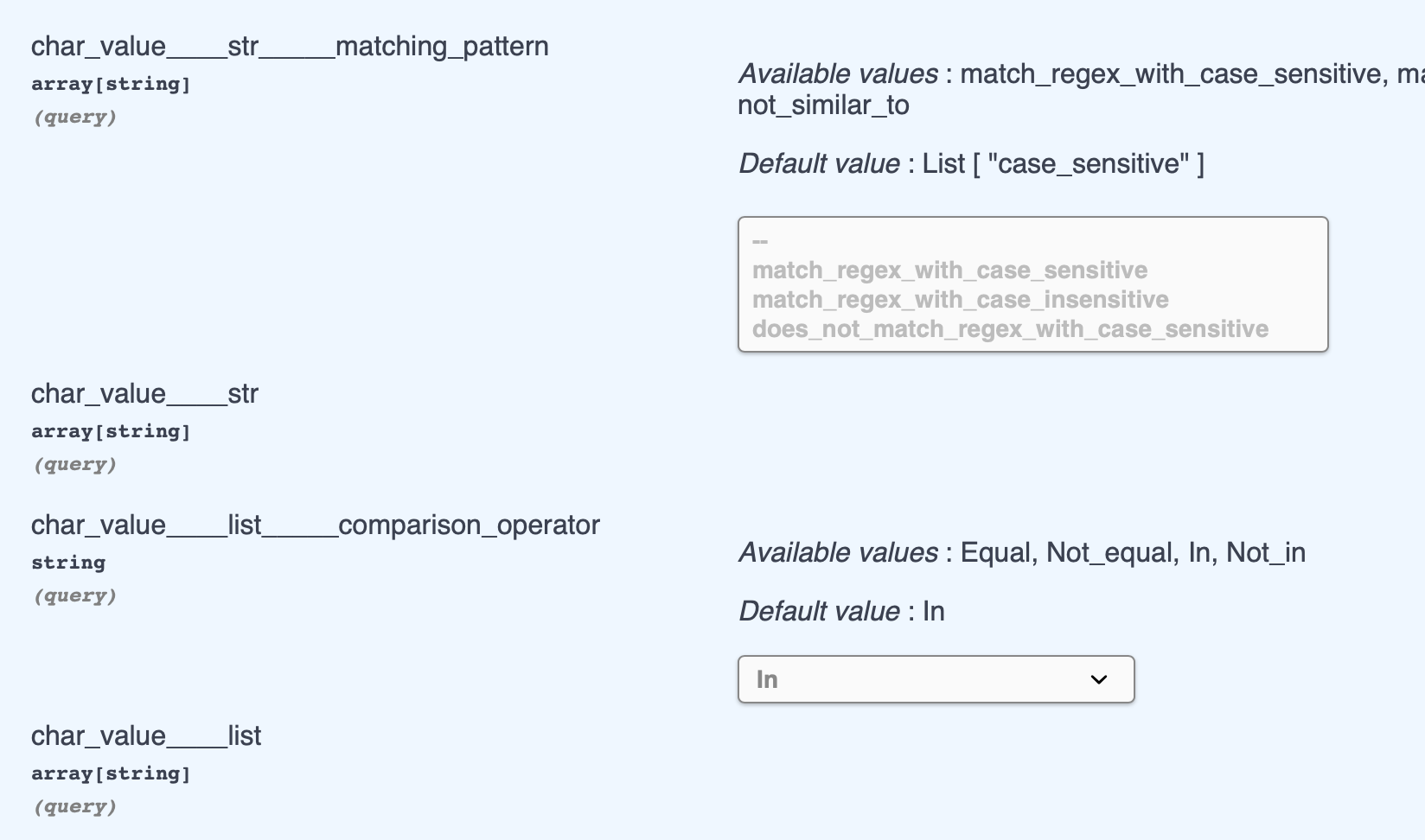
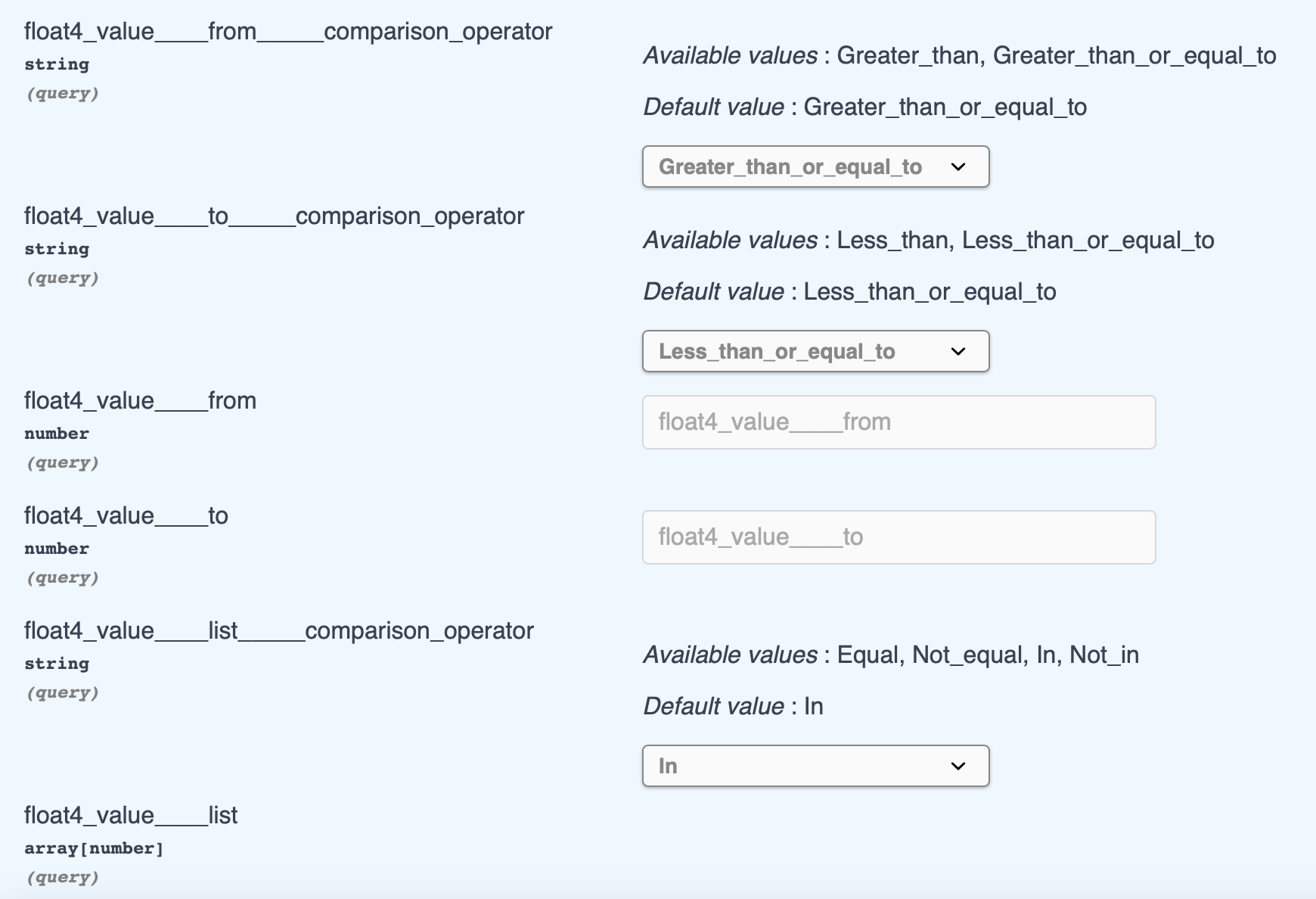
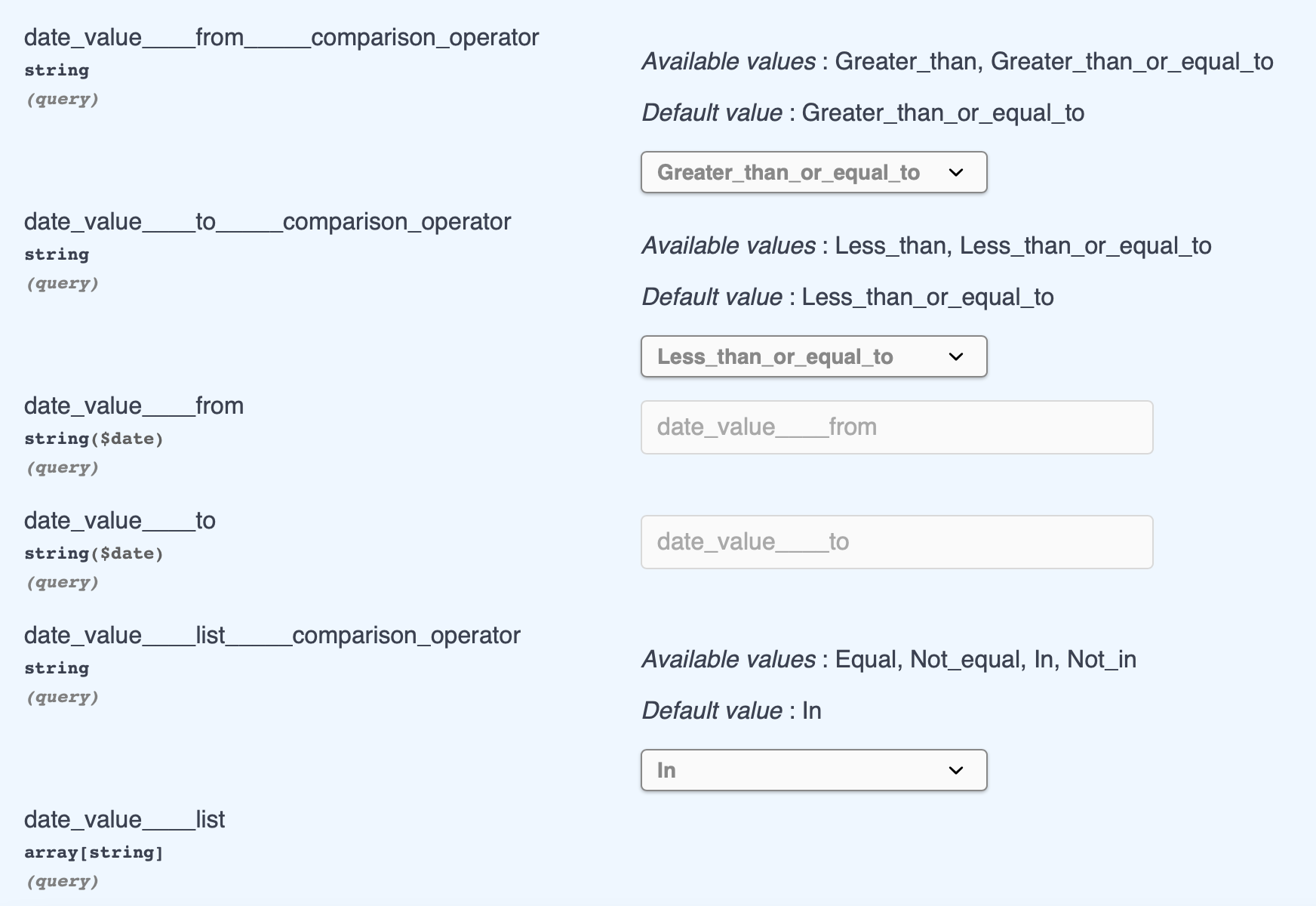
uuid supports In-place Operation only
EXTRA query parameter for GET_MANY:
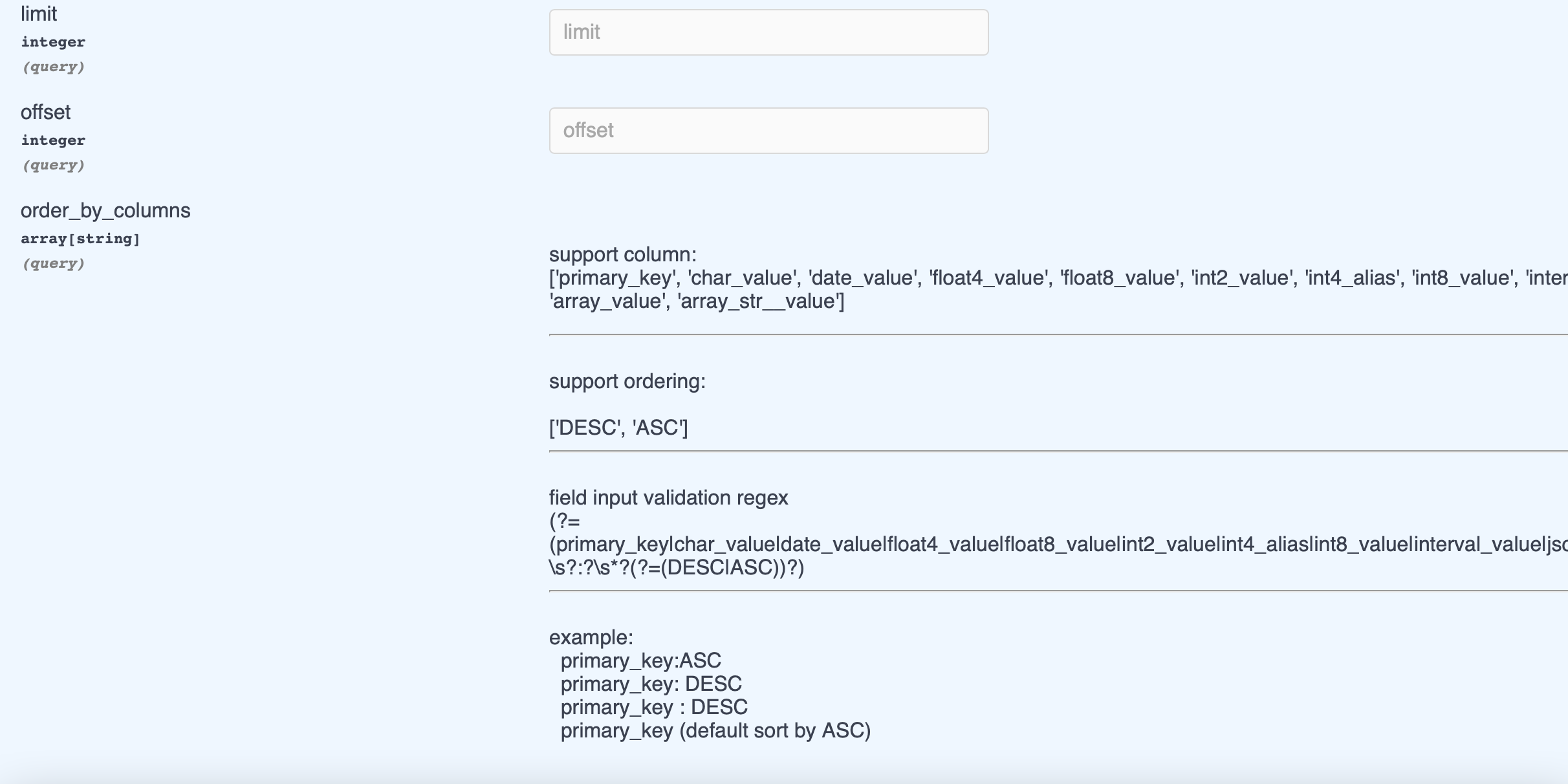
/test_CRUD?
char_value____str_____matching_pattern=match_regex_with_case_sensitive&
char_value____str_____matching_pattern=does_not_match_regex_with_case_insensitive&
char_value____str_____matching_pattern=case_sensitive&
char_value____str_____matching_pattern=not_case_insensitive&
char_value____str=a&
char_value____str=b
SELECT *
FROM untitled_table_256
WHERE (untitled_table_256.char_value ~ 'a') OR
(untitled_table_256.char_value ~ 'b' OR
(untitled_table_256.char_value !~* 'a') OR
(untitled_table_256.char_value !~* 'b' OR
untitled_table_256.char_value LIKE 'a' OR
untitled_table_256.char_value LIKE 'b' OR
untitled_table_256.char_value NOT ILIKE 'a'
OR untitled_table_256.char_value NOT ILIKE 'b'
In-place Operation
In-place support the following operation
generated sql if user select Equal operation and input True and False
preview

generated sql
select * FROM untitled_table_256
WHERE untitled_table_256.bool_value = true OR
untitled_table_256.bool_value = false
Range Searching
Range Searching support the following operation


generated sql
select * from untitled_table_256
WHERE untitled_table_256.date_value > %(date_value_1)s
select * from untitled_table_256
WHERE untitled_table_256.date_value < %(date_value_1)s
Also support your custom dependency for each api(there is a example in ./example)
In the design of this tool, the columns of the table will be used as the fields of request body.
In the basic request body in the api generated by this tool, some fields are optional if :
autoincrement is True or the server_default or default is Trueserver_default or default is TrueTBC
** Upsert supports PosgreSQL only yet
POST API will perform the data insertion action with using the basic Request Body, In addition, it also supports upsert(insert on conflict do)
The operation will use upsert instead if the unique column in the inserted row that is being inserted already exists in the table
The tool uses unique columns in the table as a parameter of on conflict , and you can define which column will be updated
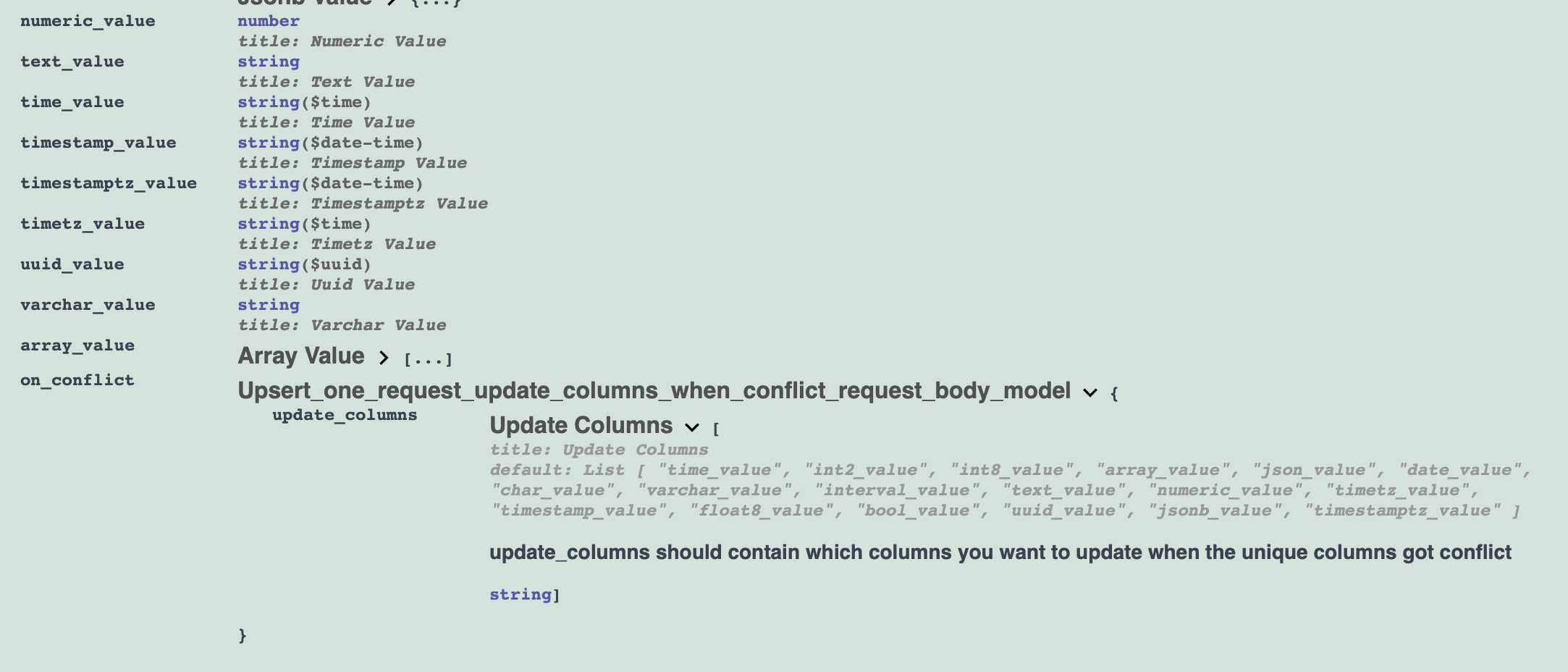
You can declare comment argument for sqlalchemy.Column to configure the description of column
example:
class Parent(Base):
__tablename__ = 'parent_o2o'
id = Column(Integer, primary_key=True,comment='parent_test')
# one-to-many collection
children = relationship("Child", back_populates="parent")
class Child(Base):
__tablename__ = 'child_o2o'
id = Column(Integer, primary_key=True,comment='child_pk_test')
parent_id = Column(Integer, ForeignKey('parent_o2o.id'),info=({'description':'child_parent_id_test'}))
# many-to-one scalar
parent = relationship("Parent", back_populates="children")
Now, FIND_ONE and FIND_MANY are supporting select data with join operation
class Parent(Base):
__tablename__ = 'parent_o2o'
id = Column(Integer, primary_key=True)
children = relationship("Child", back_populates="parent")
class Child(Base):
__tablename__ = 'child_o2o'
id = Column(Integer, primary_key=True)
parent_id = Column(Integer, ForeignKey('parent_o2o.id'))
parent = relationship("Parent", back_populates="children")
there is a relationship with using back_populates between Parent table and Child table, the parent_id in Child will refer to id column in Parent.
FastApi Quick CRUD will generate an api with a join_foreign_table field, and get api will respond to your selection of the reference data row of the corresponding table in join_foreign_table field,




when i request
Case One
curl -X 'GET' \
'http://0.0.0.0:8000/parent?join_foreign_table=child_o2o' \
-H 'accept: application/json'
Response data
[
{
"id_foreign": [
{
"id": 1,
"parent_id": 1
},
{
"id": 2,
"parent_id": 1
}
],
"id": 1
},
{
"id_foreign": [
{
"id": 3,
"parent_id": 2
},
{
"id": 4,
"parent_id": 2
}
],
"id": 2
}
]
Response headers
x-total-count: 4
There are response 4 data, response data will be grouped by the parent row, if the child refer to the same parent row
Case Two
curl -X 'GET' \
'http://0.0.0.0:8000/child?join_foreign_table=parent_o2o' \
-H 'accept: application/json'
Response data
[
{
"parent_id_foreign": [
{
"id": 1
}
],
"id": 1,
"parent_id": 1
},
{
"parent_id_foreign": [
{
"id": 1
}
],
"id": 2,
"parent_id": 1
},
{
"parent_id_foreign": [
{
"id": 2
}
],
"id": 3,
"parent_id": 2
},
{
"parent_id_foreign": [
{
"id": 2
}
],
"id": 4,
"parent_id": 2
}
]
Response Header
x-total-count: 4
When you ask for a specific resource, say a user or with query param, and the user doesn't exist
GET: get one : https://0.0.0.0:8080/api/:userid?xx=xx
UPDATE: update one : https://0.0.0.0:8080/api/:userid?xx=xx
PATCH: patch one : https://0.0.0.0:8080/api/:userid?xx=xx
DELETE: delete one : https://0.0.0.0:8080/api/:userid?xx=xx
then fastapi-qucikcrud should return 404. In this case, the client requested a resource that doesn't exist.
In the other case, you have an api that operate data on batch in the system using the following url:
GET: get many : https://0.0.0.0:8080/api/user?xx=xx
UPDATE: update many : https://0.0.0.0:8080/api/user?xx=xx
DELETE: delete many : https://0.0.0.0:8080/api/user?xx=xx
PATCH: patch many : https://0.0.0.0:8080/api/user?xx=xx
If there are no users in the system, then, in this case, you should return 204.
FAQs
A comprehensive FastaAPI's CRUD router generator for SQLALchemy.
We found that fastapi-quickcrud demonstrated a healthy version release cadence and project activity because the last version was released less than a year ago. It has 1 open source maintainer collaborating on the project.
Did you know?

Socket for GitHub automatically highlights issues in each pull request and monitors the health of all your open source dependencies. Discover the contents of your packages and block harmful activity before you install or update your dependencies.

Security News
Deno 2.2 enhances Node.js compatibility, improves dependency management, adds OpenTelemetry support, and expands linting and task automation for developers.

Security News
React's CRA deprecation announcement sparked community criticism over framework recommendations, leading to quick updates acknowledging build tools like Vite as valid alternatives.

Security News
Ransomware payment rates hit an all-time low in 2024 as law enforcement crackdowns, stronger defenses, and shifting policies make attacks riskier and less profitable.